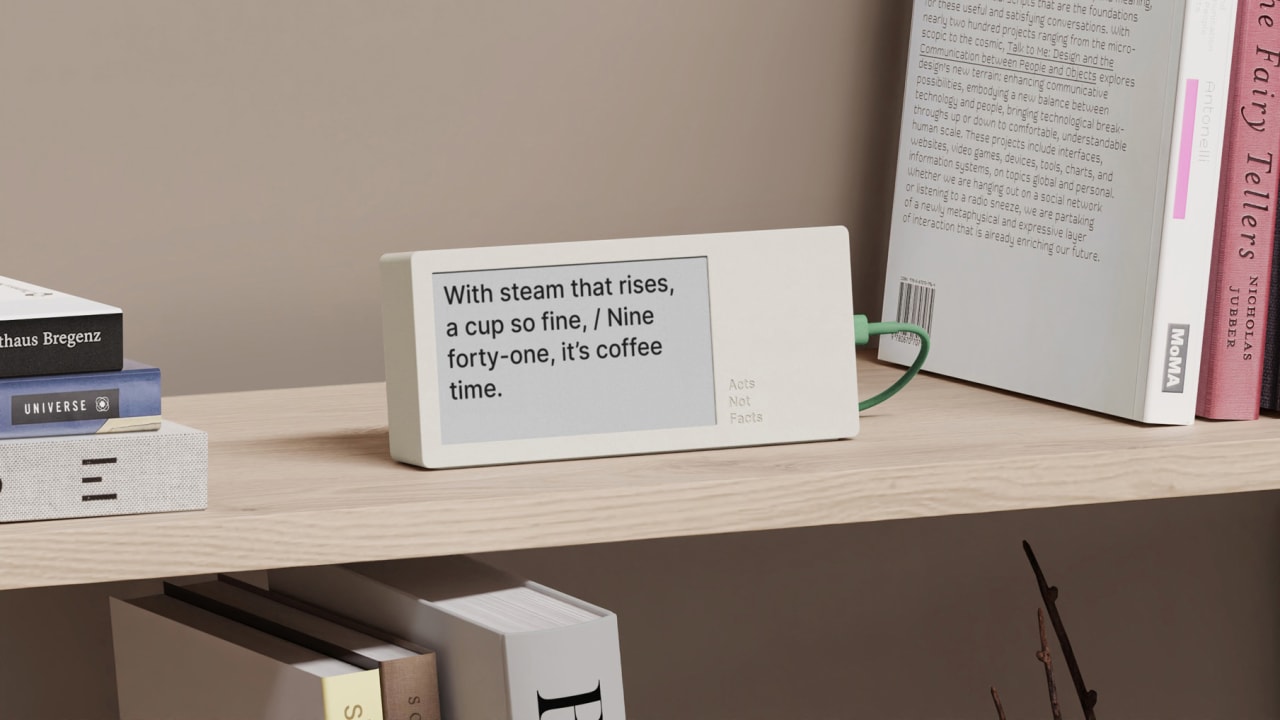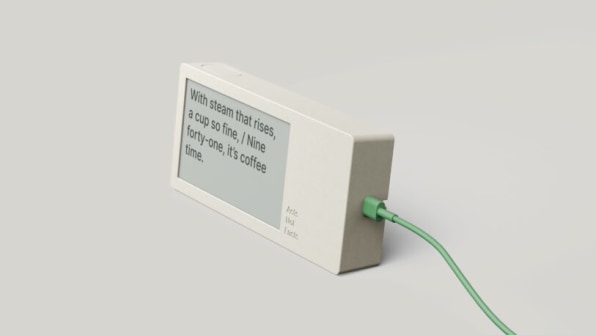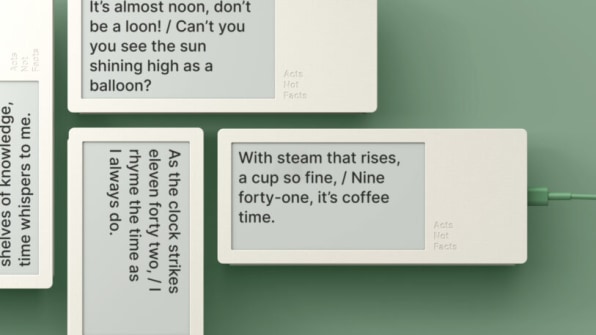This whimsical clock is the playful gadget AI needs right now
Your clock could simply display that it’s 4:09. Or your clock could grab your arm like a Parisian poet strolling along the Rhine, and extol the virtues of time: “Four-oh-nine, a cosmic sight, / Stellar symphony, shining bright.” That’s the premise of Poem/1, a new AI-powered clock that displays every minute of the day as a unique poem. “As the clock’s hands spiral, they gently chime / Four ten whispers, in the river of time.” Priced at $150 on Kickstarter today, Poem/1 was developed by Matt Webb’s one-man studio Acts Not Facts along with the industrial design firm Approach. With an e-paper display and Wi-Fi, the clock presents the time as something of a never-ending sonnet. [Image: Acts Not Facts] In a previous life, Webb ran a London hardware studio called Berg. His firm’s projects, like The Little Printer (an adorable machine that printed the news for you on receipt paper), attempted to reconcile the connection between digital information and physical space. Nearly a decade later, the entire Internet of Things as it was imagined was a clear techno-exaggeration. (Every salt shaker was not meant to connect to the internet, simply because Wi-Fi chips and other sensors got cheap!) But with the rise of LLMs and other new AI models, Webb sees a most certain new lane for products. While the current hardware craze is all about building the one AI companion for your life, Webb imagines that a sprinkling of AI will make countless objects just a bit smarter. You could see it as a second coming for IoT, but with less of a focus on a giant network of appliances than being surrounded by discrete objects capable of thinking just a tiny bit for themselves. “We’ll be in a world where we have intelligence in everything, and we’ll interact with it in small, and perhaps frivolous, ways. There’s a little glimpse of this [in the clock],” says Webb. “Maybe this is what our AI future will be like: embedded AI, which brings the world to life in small amounts, but doesn’t feel like something we need to speak to, or feel like a system.” [Image: Acts Not Facts] Webb had never intended to build a poem-writing clock. The project was actually born out of more generalized client work. He had built a project atop an LLM, but you couldn’t easily tell that it had AI at its core. He wanted a way to demonstrate its AI capabilities to the client, so he designed a system tell the time in a poem. Shortly thereafter, Webb’s old e-ink clock caught his eye. “I came downstairs one morning and thought, ‘maybe I should wire those two things together,” says Webb. “I did that and I couldn’t stop laughing. This thing was so weird, and it occasionally lies about the time in order to make the [poem] work. It was like, I have to have this on my shelf.” Webb built a proof of concept in 2023, and then—like many companies working on AI right now—jumped back into hardware production. (Yes, it still lies about the time sometimes. And, yes, Webb still sees that as part of its strange appeal.) [Image: Acts Not Facts] To commercialize the system, Webb had to rethink its backend. Originally, he imagined every clock might write its own poem each minute, but every AI query costs something, and both the energy and financial costs felt irresponsibly high to Webb. So now, a central server writes a poem for all Poem/1 units, which means Webb has given up on some of his early thoughts about customization (don’t expect a poem about the weather since the Poem/1 needs to write poems for many regions.) The clock runs on ChatGPT 3.5—a decision Webb made for its affordability. “The poems [on ChatGPT 4) are better, but it costs five times as much. So I don’t use it,” says Webb. “You get more $10 words, but you pay for them. Literary quality has a price attached as it turns out!” As a result, Webb has put more efforts into prompt engineering, or asking the system to write a good poem with perfectly formed questions. He knows that as these models evolve, he’ll need to update his prompts. “The latest models tend to mention fireflies a lot in the evening; it’s a bit obsessed with certain rhymes over others,” says Webb. “So part of my role is to be a ‘prompt whisperer,’ to keep it mixed up without over-determining the poems.” Webb also promises that the technically inclined will be able to set the Poem/1 to their own server, so anyone can customize their own AI text if they’re willing. The physical clock is simple but thoughtful. Webb designed it to have a chunky heft, to discourage people from grabbing it off the shelf like a phone. A slight taper helps it balance upright, while cable management in the back allows it to be hung. Meanwhile, if the typeface isn’t your favorite, you can actually customize the display between a few serif and sans serif options. Much like the Rabbit R1 AI walkie-talkie, Poem/1 won’t charge a subscription fee to use it—which is complicated, given the fact that the hardware sells once while its AI back

Your clock could simply display that it’s 4:09. Or your clock could grab your arm like a Parisian poet strolling along the Rhine, and extol the virtues of time: “Four-oh-nine, a cosmic sight, / Stellar symphony, shining bright.”
That’s the premise of Poem/1, a new AI-powered clock that displays every minute of the day as a unique poem.
“As the clock’s hands spiral, they gently chime / Four ten whispers, in the river of time.”
Priced at $150 on Kickstarter today, Poem/1 was developed by Matt Webb’s one-man studio Acts Not Facts along with the industrial design firm Approach. With an e-paper display and Wi-Fi, the clock presents the time as something of a never-ending sonnet.

In a previous life, Webb ran a London hardware studio called Berg. His firm’s projects, like The Little Printer (an adorable machine that printed the news for you on receipt paper), attempted to reconcile the connection between digital information and physical space.
Nearly a decade later, the entire Internet of Things as it was imagined was a clear techno-exaggeration. (Every salt shaker was not meant to connect to the internet, simply because Wi-Fi chips and other sensors got cheap!) But with the rise of LLMs and other new AI models, Webb sees a most certain new lane for products. While the current hardware craze is all about building the one AI companion for your life, Webb imagines that a sprinkling of AI will make countless objects just a bit smarter. You could see it as a second coming for IoT, but with less of a focus on a giant network of appliances than being surrounded by discrete objects capable of thinking just a tiny bit for themselves.
“We’ll be in a world where we have intelligence in everything, and we’ll interact with it in small, and perhaps frivolous, ways. There’s a little glimpse of this [in the clock],” says Webb. “Maybe this is what our AI future will be like: embedded AI, which brings the world to life in small amounts, but doesn’t feel like something we need to speak to, or feel like a system.”

Webb had never intended to build a poem-writing clock. The project was actually born out of more generalized client work. He had built a project atop an LLM, but you couldn’t easily tell that it had AI at its core. He wanted a way to demonstrate its AI capabilities to the client, so he designed a system tell the time in a poem. Shortly thereafter, Webb’s old e-ink clock caught his eye.
“I came downstairs one morning and thought, ‘maybe I should wire those two things together,” says Webb. “I did that and I couldn’t stop laughing. This thing was so weird, and it occasionally lies about the time in order to make the [poem] work. It was like, I have to have this on my shelf.”
Webb built a proof of concept in 2023, and then—like many companies working on AI right now—jumped back into hardware production. (Yes, it still lies about the time sometimes. And, yes, Webb still sees that as part of its strange appeal.)

To commercialize the system, Webb had to rethink its backend. Originally, he imagined every clock might write its own poem each minute, but every AI query costs something, and both the energy and financial costs felt irresponsibly high to Webb. So now, a central server writes a poem for all Poem/1 units, which means Webb has given up on some of his early thoughts about customization (don’t expect a poem about the weather since the Poem/1 needs to write poems for many regions.)
The clock runs on ChatGPT 3.5—a decision Webb made for its affordability. “The poems [on ChatGPT 4) are better, but it costs five times as much. So I don’t use it,” says Webb. “You get more $10 words, but you pay for them. Literary quality has a price attached as it turns out!”
As a result, Webb has put more efforts into prompt engineering, or asking the system to write a good poem with perfectly formed questions. He knows that as these models evolve, he’ll need to update his prompts. “The latest models tend to mention fireflies a lot in the evening; it’s a bit obsessed with certain rhymes over others,” says Webb. “So part of my role is to be a ‘prompt whisperer,’ to keep it mixed up without over-determining the poems.”
Webb also promises that the technically inclined will be able to set the Poem/1 to their own server, so anyone can customize their own AI text if they’re willing.
The physical clock is simple but thoughtful. Webb designed it to have a chunky heft, to discourage people from grabbing it off the shelf like a phone. A slight taper helps it balance upright, while cable management in the back allows it to be hung. Meanwhile, if the typeface isn’t your favorite, you can actually customize the display between a few serif and sans serif options.
Much like the Rabbit R1 AI walkie-talkie, Poem/1 won’t charge a subscription fee to use it—which is complicated, given the fact that the hardware sells once while its AI backend requires an ongoing spend. To resolve this cost, Webb promises he’s budgeting a fund simply to run the AI, and he’s built three years of runway for this initiative into the business model.
“My bet is AI will drop in price enough at that time to keep it going indefinitely,” says Webb.






















